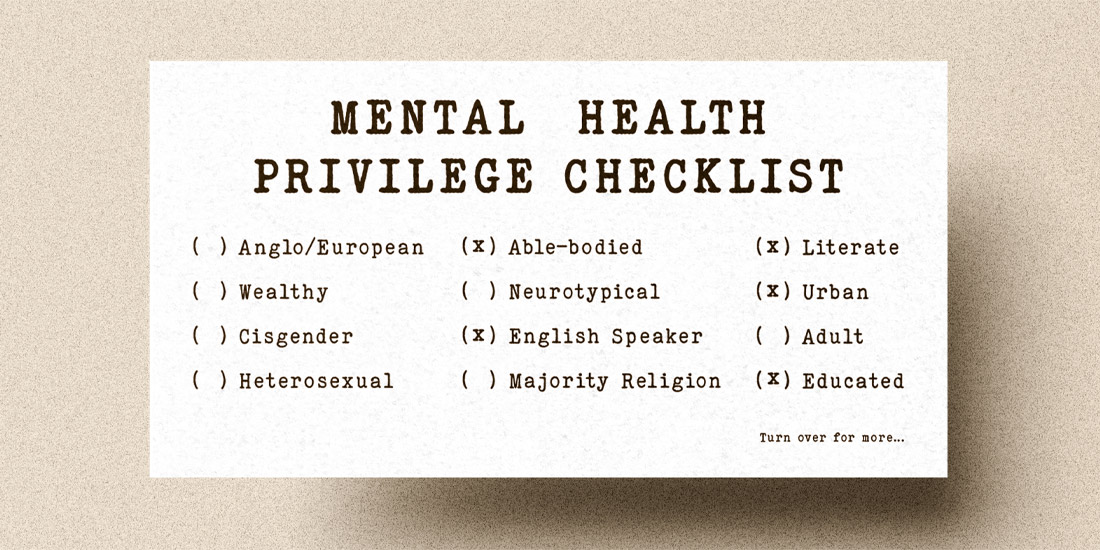Today, as Orygen acknowledges World Mental Health Day, we encourage everyone to pause and consider this year's theme from the World Federation of Mental Health: mental health in an unequal world.
Reflecting on this, Emily Unity, a youth peer worker at Orygen and Craig Hodges, director of Orygen Global, have shared their thoughts on equity in youth mental health. Read Craig's reflection Mental health care for all: let’s make it a reality.
Check your mental health privilege
 Artwork supplied: Emily Unity
Artwork supplied: Emily Unity
People of lived experience of mental ill-health may be in the same storm. However, we are not in the same boat. Some of us have yachts, some canoes and others are drowning.
Mental health privilege exists on a spectrum. There is a reason why suicide rates are higher in certain communities[1]. There are a multitude of sub-privileges that feed into mental health privilege, including class, race, gender, age and even our specific diagnosis.
I am a person who is neurodiverse, queer and culturally diverse. However, I am still middle-class, educated, able-bodied and have better access to mental health support than many others.
I want to use my privileges to raise awareness of the inequalities in mental health care. I hope that this piece serves as an invitation to see your experiences and those of others in a new light.
What mental health privilege looks like
Financial privilege
When you have financial privilege:
- you don’t have to choose between a psychologist appointment and eating for the week;
- if you get a parking ticket or an unexpected bill, you can still afford your medication; and
- you can actually prioritise your mental health because you’re not struggling to meet the basic needs of shelter, food or water.
Cultural privilege
When you have racial or cultural privilege:
- you don’t have to translate your experiences into someone else’s understanding of mental health;
- your culture won’t fight you on the fact that mental health exists, that it requires treatment or medical intervention; and
- your community doesn’t equate a religious or spiritual leader to a medical professional.
Hetero and cis privilege
When you have hetero and cis privilege:
- you don’t have to think twice about which box you tick on a form;
- you don’t get deadnamed, misgendered or mispronounced in your treatment history; and
- you will not be rejected from a service because of your gender or sexual identity.
Able-bodied privilege
When you have able-bodied privilege:
- you don’t have to worry about being physically unable to enter a service;
- you will not have practitioners constantly assume that you need help or need saving; and
- you don’t worry that your application for support will be denied based on your disability.
Age privilege
When you have age privilege:
- you don’t have to worry if your right to confidentiality is dependent upon your age;
- you’re not forced to fight to be a decision-maker in your own care; and
- practitioners and professionals don’t trust other people more than you just because they’re older.
Diagnosis privilege
When you have diagnosis privilege:
- you are not handballed between services because your severity is always “too much” or “not enough.”;
- you don’t have to go without treatment or answers because you don’t discretely fit into a certain diagnostic criterion; and
- you’re not held as an unreliable witness to your own condition.
What you can do
Colossal systemic change is not going to happen within the time it takes you to read this article. However, that doesn’t mean that we can’t make a change. Here are three tips for you to consider regarding mental health privilege.
Learn about yourself
We must think critically about our privileges in order to address them. Checking your privilege may be uncomfortable at times. However, this discomfort can be used to recognise when change is needed.
Learn about others
Start learning about what other mental health privileges look like from the people experiencing them. It’s imperative that we understand the limits of our own view. We are each the experts of our own experience.
Speak up and show up
Ask questions, raise issues, and make space for those people that are less privileged. Leverage your privilege to amplify the voices that are not heard as often. Identify and advocate for not just co-design, but genuine lived experience leadership.
Conclusion
Equal access to mental health care should be a right, not a privilege. I don’t believe we’re fixing our system unless we’re fixing it for everyone.
I am committed to leveraging my privilege to help others, and I hope that you will too. I believe that we all have a role to play in creating a world that is equal for all people, regardless of background, identity, circumstance or neurodiversity.
Mental health care for all: let's make it a reality